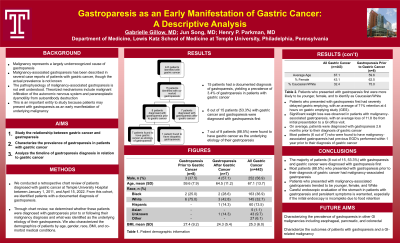Monday Poster Session
Category: Stomach
P3314 - Gastroparesis as an Early Manifestation of Gastric Cancer: A Descriptive Analysis
Monday, October 28, 2024
10:30 AM - 4:00 PM ET
Location: Exhibit Hall E

Has Audio

Gabrielle Gillow, MD
Temple University Hospital
Philadelphia, PA
Presenting Author(s)
Gabrielle Gillow, MD1, Jun Song, MD2, Henry P. Parkman, MD3
1Temple University Hospital, Philadelphia, PA; 2Loma Linda University Medical Center, Loma Linda, CA; 3Temple University, Strafford, PA
Introduction: Malignancy represents a largely underrecognized cause of gastroparesis. Although several case reports have documented gastroparesis in patients with gastric cancer, the prevalence of malignancy-associated gastroparesis is not well known. This is an important entity to study because patients may present with gastroparesis as an early manifestation of underlying malignancy. The aim of this project is to characterize the prevalence and timeline of diagnosis of gastroparesis in patients with gastric cancer.
Methods: We performed a retrospective chart review of patients diagnosed with gastric cancer at our institution from January 1, 2011 to April 15, 2022. From this cohort, we identified patients with a documented diagnosis of gastroparesis. We then determined via chart review whether these patients were diagnosed with gastroparesis prior to or following their malignancy diagnosis, and what was established as the underlying etiology of their gastroparesis. We also characterized the demographics of patients by age, gender, race, and BMI.
Results: 443 patients were identified with a diagnosis of gastric cancer, 15 of which had co-morbid gastroparesis (prevalence of 3.4%). We found that 8 out of 15 patients (53.3%) with gastric cancer and gastroparesis were diagnosed with gastroparesis first. Of these patients, 7 out of 8 (88.5%) were found to have malignancy-associated gastroparesis as the underlying etiology. On initial evaluation, the patients who first presented with gastroparesis had severely delayed gastric emptying on scintigraphy (average 71% retention at 4 hours). Interestingly, 6 out of 7 of these patients had prior EGD’s performed within 1 year of their malignancy diagnosis. Two of these EGD’s were technically limited due to food retention. 7 patients were diagnosed with gastroparesis after their diagnosis of gastric cancer (46.7%).
Discussion: Our study found that most patients with gastroparesis and gastric cancer were diagnosed with gastroparesis prior to their malignancy diagnosis. Further, the majority of this subset of patients were actually found to have underlying malignancy as the etiology of their gastroparesis. On a clinical practice level, this supports careful endoscopic evaluation of the stomach in patients with gastroparesis and persistent symptoms, especially if an initial endoscopy was incomplete due to food retention. Further work will include characterizing the prevalence of gastroparesis in other GI malignancies including esophageal, pancreatic, and colorectal.
Note: The table for this abstract can be viewed in the ePoster Gallery section of the ACG 2024 ePoster Site or in The American Journal of Gastroenterology's abstract supplement issue, both of which will be available starting October 27, 2024.
Disclosures:
Gabrielle Gillow, MD1, Jun Song, MD2, Henry P. Parkman, MD3. P3314 - Gastroparesis as an Early Manifestation of Gastric Cancer: A Descriptive Analysis, ACG 2024 Annual Scientific Meeting Abstracts. Philadelphia, PA: American College of Gastroenterology.
1Temple University Hospital, Philadelphia, PA; 2Loma Linda University Medical Center, Loma Linda, CA; 3Temple University, Strafford, PA
Introduction: Malignancy represents a largely underrecognized cause of gastroparesis. Although several case reports have documented gastroparesis in patients with gastric cancer, the prevalence of malignancy-associated gastroparesis is not well known. This is an important entity to study because patients may present with gastroparesis as an early manifestation of underlying malignancy. The aim of this project is to characterize the prevalence and timeline of diagnosis of gastroparesis in patients with gastric cancer.
Methods: We performed a retrospective chart review of patients diagnosed with gastric cancer at our institution from January 1, 2011 to April 15, 2022. From this cohort, we identified patients with a documented diagnosis of gastroparesis. We then determined via chart review whether these patients were diagnosed with gastroparesis prior to or following their malignancy diagnosis, and what was established as the underlying etiology of their gastroparesis. We also characterized the demographics of patients by age, gender, race, and BMI.
Results: 443 patients were identified with a diagnosis of gastric cancer, 15 of which had co-morbid gastroparesis (prevalence of 3.4%). We found that 8 out of 15 patients (53.3%) with gastric cancer and gastroparesis were diagnosed with gastroparesis first. Of these patients, 7 out of 8 (88.5%) were found to have malignancy-associated gastroparesis as the underlying etiology. On initial evaluation, the patients who first presented with gastroparesis had severely delayed gastric emptying on scintigraphy (average 71% retention at 4 hours). Interestingly, 6 out of 7 of these patients had prior EGD’s performed within 1 year of their malignancy diagnosis. Two of these EGD’s were technically limited due to food retention. 7 patients were diagnosed with gastroparesis after their diagnosis of gastric cancer (46.7%).
Discussion: Our study found that most patients with gastroparesis and gastric cancer were diagnosed with gastroparesis prior to their malignancy diagnosis. Further, the majority of this subset of patients were actually found to have underlying malignancy as the etiology of their gastroparesis. On a clinical practice level, this supports careful endoscopic evaluation of the stomach in patients with gastroparesis and persistent symptoms, especially if an initial endoscopy was incomplete due to food retention. Further work will include characterizing the prevalence of gastroparesis in other GI malignancies including esophageal, pancreatic, and colorectal.
Note: The table for this abstract can be viewed in the ePoster Gallery section of the ACG 2024 ePoster Site or in The American Journal of Gastroenterology's abstract supplement issue, both of which will be available starting October 27, 2024.
Disclosures:
Gabrielle Gillow indicated no relevant financial relationships.
Jun Song indicated no relevant financial relationships.
Henry Parkman: Evoke Pharma – Consultant. Medtronic Enterra – Consultant. Takeda – Consultant.
Gabrielle Gillow, MD1, Jun Song, MD2, Henry P. Parkman, MD3. P3314 - Gastroparesis as an Early Manifestation of Gastric Cancer: A Descriptive Analysis, ACG 2024 Annual Scientific Meeting Abstracts. Philadelphia, PA: American College of Gastroenterology.
